Chapter 2 Functions of Management
Chapter 2 Functions of Management
1. (A) Select the correct options and rewrite the sentences
Question 1.
The functions of management start with ……………… function.
(a) organising
(b) planning
(c) co-ordinating
Answer:
planning
Question 2.
The functions of management end with ………………
(a) directing
(b) staffing
(c) controlling
Answer:
controlling
Question 3.
……………. sets out standards for controlling.
(a) Staffing
(b) Planning
(c) Co-ordinating
Answer:
Planning
Question 4.
Organizational function is important for execution of the plans which have been prepared by ……………. management.
(a) top level
(b) middle level
(c) lower level
Answer:
top level
Question 5.
……………… is the function which supports to activate the plans with the help of employees.
(a) Staffing
(b) Directing
(c) Co-ordinating
Answer:
Directing
Question 6.
………………. is the function of execution according to the plan and the organisational structure.
(a) Controlling
(b) Directing
(c) Staffing
Answer:
Directing
Question 7.
………………. arranges the work in such a way that minimum conflicts are raised.
(a) Co-ordinating
(b) Organizing
(c) Controlling
Answer:
Co-ordination.
1. (B) Match the pairs
Question 1.

Answer:

1. (C) Give one word/phrase/term for the following statements
Question 1.
The right person at the job with right pay.
Answer:
Staffing
Question 2.
A person who shows the correct path as well as guides employees in solving the problems.
Answer:
Director
Question 3.
First function of management.
Answer:
Planning
Question 4.
Last function of management.
Answer:
Controlling
Question 5.
It is an intellectual process of logical thinking and rational decision-making.
Answer:
Planning
Question 6.
The term that is used to denote the structure.
Answer:
Organisation
Question 7.
It is the process of attracting, recruiting, selecting, placing, appraising and remunerating the people.
Answer:
Staffing
Question 8.
The process that leads the employees towards the accomplishment of organisational goals.
Answer:
Directing
Question 9.
It increases the team spirit of work place.
Answer:
Co-ordinating
Question 10.
It is the process of comparing the actual performance with the predetermined standard performance.
Answer:
Controlling.
1. (D) State whether the following statements are True or False
Question 1.
Every function of management is not based on planning.
Answer:
False
Question 2.
Specialization in activities leads to increase in organisational efficiency.
Answer:
True
Question 3.
Qualified, efficient and skilled work force is always an asset of the organization.
Answer:
True
Question 4.
Cooperation is not necessary for smooth flow of organisational activities.
Answer:
False
Question 5.
Co-ordination motivates the employees to take initiative while completing their assigned task.
Answer:
True
Question 6.
Standards are not set for every performance in controlling function.
Answer:
False
1. (E) Find the odd one
Question 1.
Planning, Organizing, Staffing, Writing.
Answer:
Writing
Question 2.
Selecting, Training, Co-ordinating, Placing
Answer:
Co-ordinating.
1. (F) Complete the sentences
Question 1.
The tasks of getting the things done by others is known as ……………..
Answer:
Management
Question 2.
The functions of manager start with …………………
Answer:
Planning
Question 3.
The …………….. function of management initiates action
Answer:
Directing
Question 4.
Recruitments are done under ……………….. function.
Answer:
Staffing
Question 5.
………………. is the fundamental function of management.
Answer:
Planning
Question 6.
………………. integrates departmental activities for achieving common goal of the organisation.
Answer:
Co-ordinating
Question 7.
……………… is the last function of management.
Answer:
Controlling
1. (G) Select the correct option from the bracket
Question 1.
Planning is a detailed programme of (present/ future/past) course of action.
Answer:
future
Question 2.
Directing is a responsibility of (manager/ workers/people) at all levels.
Answer:
manager
Question 3.
Qualified, efficient and skilled workforce is always an (liabilities/assets/expenses) of the organization.
Answer:
assets.
1. (H) Answer in one sentence
Question 1.
What is management?
Answer:
The tasks of getting the things done by others to achieve organisational goal is called management.
Question 2.
What is planning?
Answer:
Planning means deciding in advance what to do when to do, how to do, where to do it and who is to do it.
Question 3.
What is staffing?
Answer:
The process of attracting, recruiting, selecting, placing, appraising, remunerating, developing and retaining the best workforce is called staffing.
Question 4.
What is directing?
Answer:
Directing is the process of instructing, guiding, communicating, inspiring, motivating and supervising the employees to achieve the pre-determined goals of the organisation.
Question 5.
What is controlling ?
Answer:
Controlling is a function of comparing the actual performance with the predetermined standard performance to measure deviation if any, identifying causes of deviation and suggest corrective measures.
1. (I) Correct the underlined word and rewrite the following sentences
Question 1.
Factors of business environment are always fixed.
Answer:
Factors of business environment are always changing.
Question 2.
Staffing is concerned with machines.
Answer:
Staffing is concerned with humans.
Question 3.
Directing is a function of comparing the actual performance with the pre-determined performance.
Answer:
Controlling is a function of comparing the actual performance with the pre-determined performance.
Question 4.
Co-ordination helps to maximise the wastage of resources and controls the cost of work.
Answer:
Co-ordination helps to minimise the wastage of resources and controls the cost of work.
Question 5.
Controlling measures are rigid to some extent.
Answer:
Controlling measures are flexible to some extent.
1. (J) Arrange in proper order
Question 1.
Controlling, Organizing, Planning.
Answer:
Planning, Organising, Controlling.
Question 2.
Directing, Co-ordinating, Staffing.
Answer:
Staffing, Directing, Co-ordinating.
2. Explain the following terms/concepts
Question 1.
Management
Answer:
The task of getting the work done by others to achieve organisational goal is called management. According to L. A. Allen, ‘Management is what manager does. Management is a set of principles which relate to the various functions such as planning, organising, staffing, directing, co-ordinating, controlling, etc. which are helpful in achieving organisational goals.
Question 2.
Planning
Answer:
Planning is the basic function of management. Planning is an intellectual process of logical thinking and rational decision-making. It includes deciding the things to be done in advance. In short, planning is a detailed programme of future course of action. Proper planning and its implementation is key to achieve the objectives of an organisation.
Question 3.
Organising
Answer:
Organising is the process of identifying, bringing the required resources together such as men, money, material, machines and method and arranging them in proper manner to achieve the goals of an organisation. It is prepared by the top level management. Organising function decides the ways and means to achieve what has been planned. Organising is more important in executing the plan.
Question 4.
Staffing
Answer:
Staffing is the function of execution according to plan and organisational structure. It is the process of attracting, recruiting, training, developing, appraising, remunerating, developing and retaining the best workforce. Right person at right job with right pay is the basic principle of staffing. This function is concerned with managing humans and not material.
Question 5.
Directing
Answer:
Directing is the process of instructing, guiding, communicating, inspiring, motivating and supervising the employees to achieve pre-determined goals of an organisation. Director shows correct path as well as guides the employees in solving the problems wherever necessary. Directing is the soul of management function.
3. Study the following case/situation and express your opinion
Question 1.
Mr. Ram, an emerging entrepreneur has designed a structure of his business organization by taking into consideration the required resources such as land, money, machinery, workforce, etc. for his new business. He appointed Mr. Shyam as a manager. Mr. Ram has assigned the responsibilities such as recruitment, selection, training and development and to determine the remuneration of the employees to Mr. Shyam. Mr, Ram. has also appointed Mr. Shubham to supervise the work done by the employees according to the standards given to the employees, Mr. Shubham has also to suggest the remedies to the employees wherever necessary. On this context, find out the management functions performed by
(i) Mr. Ram
(ii) Mr. Shyam
(iii) Mr. Shubham
Answer:
(i) Mr. Ram performs the function of planning and organising. He is an emerging entrepreneur and plans the business structure and organises different resources.
(ii) Mr Shyam is performing the function of staffing as his main duty is to recruit, select, train and develop the employees and to decide their remuneration accordingly.
(iii) Mr. Subham is performing the function of controlling. He compares actual performances of employees with standard performance given. He discovers causes of deviations and suggests remedies to overcome deviations.
Question 2.
In XYZ Company, Mr. Lele gives instructions to the employees working under him, provide guidance and motivates them for their best performance. On the other hand, Mr. Sawed takes effort to harmonize the work done by the employees of different departments while achieving organisational goal. Mr. Desai is looking after the arrangement of required resources the business organization.
Mention the name of employee engaged in following functions :
(i) Organisation
(ii) Direction
(iii) Coordination
Answer:
(i) Mr Desai is engaged in the organising function as he is looking after arrangement of required resources for the business organisation.
(ii) Mr. Lele is engaged in the function of directing as he gives instructions to the employees working under him, provides guidance and motivates them for their best performance.
(iii) Mr. Sayyed is engaged in the function of co-ordination as he takes effort to harmonize the work done by the employees of different departments.
4. Distinguish between
Question 1.
Planning and Organising
Answer:

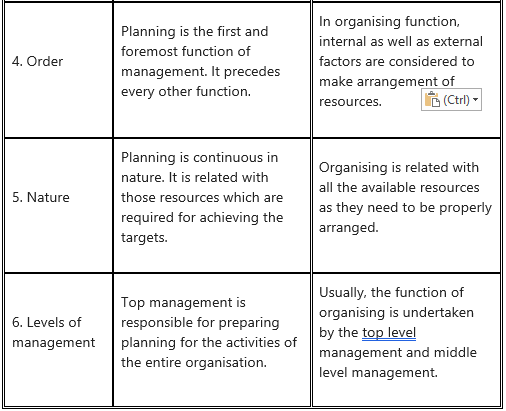
Question 2.
Organising and Staffing
Answer:
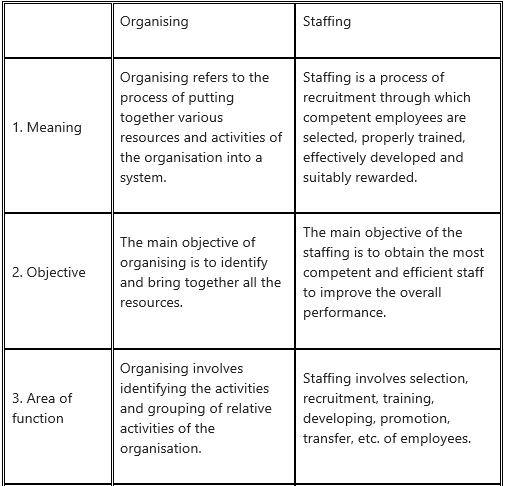

Question 3.
Staffing and Directing
Answer:
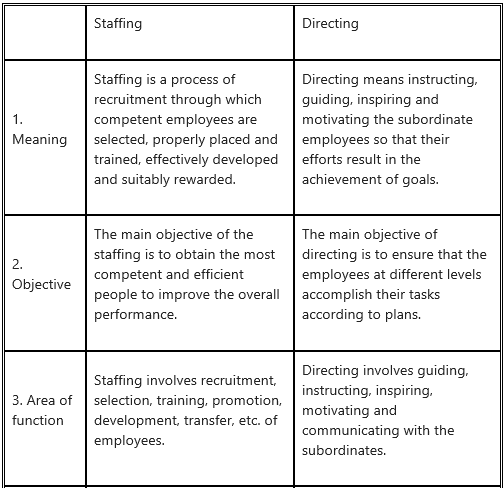

Question 4.
Directing and Controlling
Question 5.
Co-ordination and Controlling
Answer:
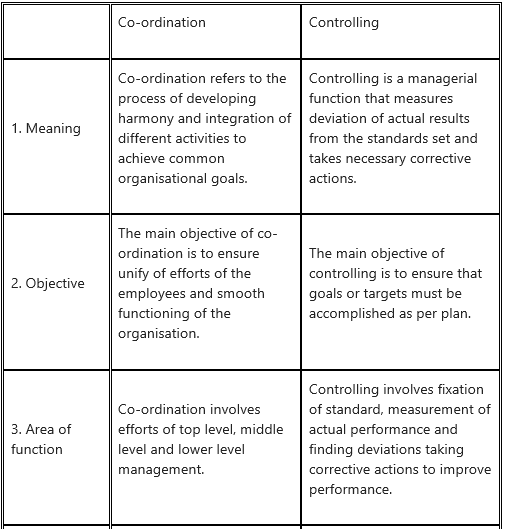
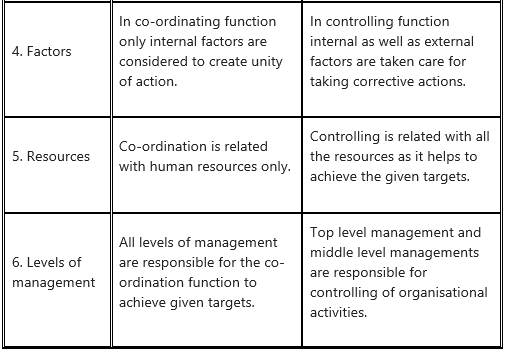
Question 6.
Planning and Controlling
Answer:
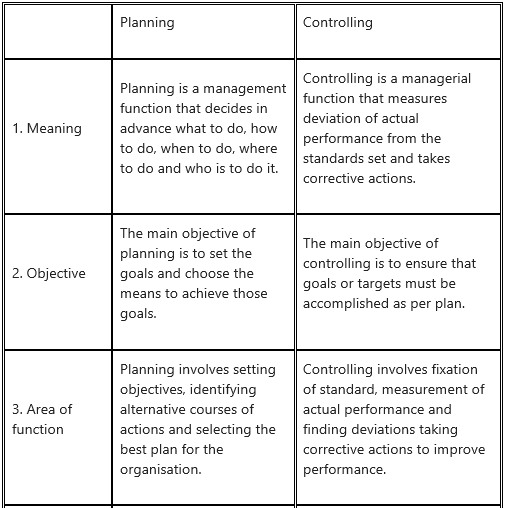
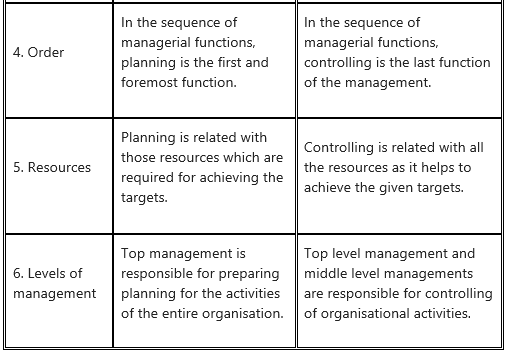
Question 7.
Organising and Directing
Question 8.
Organising and Co-ordinating
Answer:
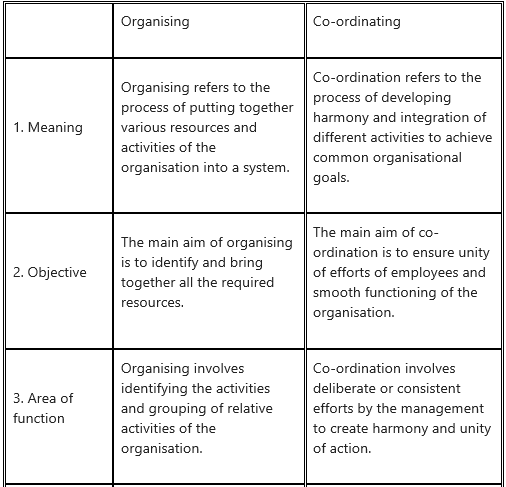
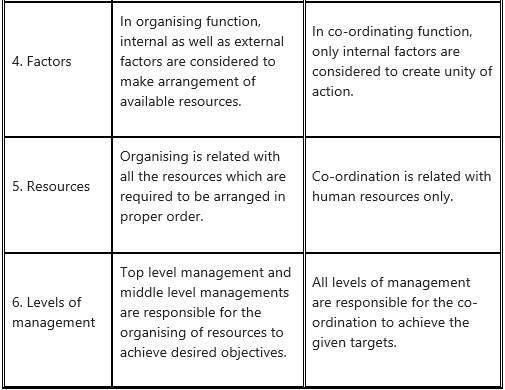
5. Answer in brief
Question 1.
Explain any five points of importance of planning.
Answer:
Importance : The importance of planning is explained as follows:
(1) Helps to set clear objectives : Planning is the process of setting objectives, targets and formulating plans to achieve these objectives. With the help of proper planning, management can analyse the present condition of the organisation and can identify the ways of attaining the desired position in future.
(2) Provides path of action : Planning ensures that the goals or objectives are clearly set. It acts as a guide and provides direction for doing the right things at the right time and in a right way. It helps the employees to understand the organisational goals and what they must do to achieve the same.
(3) Planning improves performance : It helps manager to improve future performances of employees by setting clear objectives and selecting a right course of action. It leads to efficiency in working of the employees. Due to proper planning the employees can work according to guidelines which helps them to improve performance. This results into higher profitability of the organisation.
(4) Minimizes the risk : Planning is the process of looking into the future and anticipating the future changes. By deciding in advance the task to be performed, planning helps to deal with future changes and unforeseen events. Planning helps in anticipation of risk and decide preventive measures accordingly. Though changes or risks cannot be eliminated but proper planning minimizes them.
(5) Planning leads to optimum utilization of resources: Plans are made on the basis of availability of resources with proper allocation for various activities. Proper allocation of resources brings higher efficiency and desired results with minimum wastages.
Question 2.
Explain any five points of importance of organizing.
Answer:
Importance : The importance of organising is explained as follows:
(1) Facilitates administration as well as operation : Organising is the process of identifying, grouping and assigning the activities of administration and proceeding according to its operational activity. Due to proper grouping of the task and employees, there is a reduction in duplication of work results in effective delegation.
(2) Brings specialisation : Organising starts from dividing the total work into smaller units and assigning them to different individuals according to their qualification, capabilities and experience. It leads to increase in overall productivity.
(3) Defines job properly : In the organising function the employees are assigned different jobs according to their qualification, skill and experience and the managers clearly define the details of each job. It clearly spells out what exactly has to be done in every job by each employee.
(4) Clarifies authority and responsibility : The organising function clearly defines authority, power, position of every manager and responsibility, accountability of every employee. This enables proper execution of work and at the same time eliminates confusion, duplication, misunderstanding. It also helps to bring efficiency in working of managers.
(5) Establishes Co-ordination : Organising function helps in establishing co-ordination among different activities of different department. Organising defines clear cut relationship among various positions and ensures mutual co-operation amongst them. Organising helps in co-ordination between different levels of managers of different departments for smooth functioning of an organisation.
Question 3.
Describe any five points of importance of staffing.
Answer:
Importance : The importance of staffing is given as follows:
(1) Effective management function : Staffing is considered an effective managerial function as it deals with human resource. Employees appointed in the organisation through staffing function perform various activities in different areas of the organisation such as production, marketing, finance, etc.
(2) Effective utilization of Human Resources : A well organised staffing department discovers the talented, skilful, experienced and qualified staff. Proper care is taken at every stage of recruitment, selection, placement, etc. It ensures smooth functioning of all the managerial areas of the organisation.
(3) Builds relationship : A sound staffing policy creates a team spirit among the employees. Due to team spirit, a sense of belongingness among the employees is developed. This in turn leads to better communication and co-ordination of managerial efforts in an organisation. A smooth human relation is the key to better flow of co-ordination in an organisation.
(4) Helps Human Resource Development: Skilled and experienced employee is an asset of a business organisation. Staffing function of management is mainly concerned with human factor of production. Efforts are made to utilise the human resources more efficiently.
(5) Helps in effective use of technology and other resources : Staffing function trains employees to use latest technology, capital, material, and method of work more effectively. This brings competitive strength to the organisation. It also helps in improving standard of work and productively in terms of quality and quantity.
(6) Improve efficiency : Regular training and development programmes provide to employees to improve their performance levels. Through proper selection the organisation gets talented and quality employees.
Question 4.
Explain any five points of importance of directing.
Answer:
Importance : The importance of Directing is as follows:
(1) Initiates action : Direction initiates action. It activates employees to put in their best efforts, to achieve the goals. Without effective direction, other managerial functions like planning, organising, staffing, co-ordinating and controlling become ineffective. Managers have to stimulate action by issuing instructions like what to do, how to do, etc. to the subordinates and by supervising them from time to time.
(2) Integrates efforts: At every level of the management there are subordinates under managers. The work assigned to these subordinates is interrelated. The directing function integrates the activities of the subordinates by guidance, supervision and counselling. It results in achievement of organisational goals.
(3) Means of motivation: Objectives of an organisation can be achieved only if the people working in it are properly motivated through monetary and non-monetary incentives. It boosts the morale of employees, contribute their maximum efforts and motivates them to give their best.
(4) Provides stability: Effective direction through supervision, motivation, leadership and communication provides stability and maintains balance in the organisation. This in turn results in the growth of the enterprise at faster rate. For long term survival of the organisation, stability in the organisation are necessary.
(5) Coping up with the changes : Effective direction facilitates changes in the organisation. It enables the enterprise to adopt advance technology, new methods of production, modern techniques of management, etc. It is a direction function which helps the superiors to motivate the subordinates to adapt to the new changes, new challenges, etc. Adapting to the environmental changes is necessary for the growth of the organisation.
Question 5.
Describe any five points of importance of ! coordinating.
Answer:
Importance : The importance of Co-ordinating is explained as follows:
(1) Encourages Team Spirit : Co-ordination is concerned with integrated group efforts. Team work under the direction of the manager encourages the subordinates to work sincerely and give better performance to achieve organisational goals. Co-ordination helps to reduce the conflicts between the employees and departments regarding policies, roles, etc. and increase their team spirit.
(2) Gives Proper Direction : Group or combined efforts of all the employees in an organisation helps to co-ordinate with each other and achieve the desired goals. Thus, combined efforts of all the employees always help an organisation to remove its limitations and achieve organisational objectives. The interdependence of departments gives proper direction to the employees.
(3) Facilitates motivation : In the process of co-ordination the superiors motivate their subordinates by providing them with monetary and other incentives. An effective co-ordination increases efficiency and results in growth and prosperity of the organisation which encourages job security, high income, promotion and incentives.
(4) Optimum utilisation of resources : Proper and effective co-ordination helps to bring together all the resources of the organisation. This in turn helps to make the optimum possible use of available resources to achieve organisational goals. Co-ordination also helps to avoid wastage of resources and control the cost.
(5) Achieve organisational objectives : Proper coordination helps to reduce wastages, delays in completion of targets, departmental disputes, etc. of the organisation to a great extent. This ensures smooth working of the organisation in the process of achievement of objectives.
6. Justify the following statements
Question 1.
Planning is the first function of management.
Answer:
(1) Planning is the basic function of management. Every function of management is based on planning. Planning is an intellectual process of logical thinking and rational decision i making.
(2) Designing i.e. doing a proper planning and implementing it accordingly is the key of achieving the objectives of organisation.
(3) Planning means deciding in advance what to do, when to do, how to do, where to do and who is to do it. Thus, it is a detailed programme of future courses of action.
(4) Planning involves setting objectives, identifying alternative courses of action and selecting the best plan. It focuses on organisation’s objective and develop various course of action to achieve those goals.
Question 2.
Controlling is the last function of management.
Answer:
(1) It is important for am organisation to keep a check on whether things are moving as per plan or not. So controlling function comes as the last but indispensable function of management. The effectiveness of planning can be determined with the function of controlling.
(2) Controlling function helps in comparing the actual performance with the pre-determined standard and performance. It is the process of bringing about conformity of performance with planned action.
(3) Controlling function helps in measuring deviation, if any, identifies the course of deviation and suggests corrective measures. The process of controlling helps in formulation of future plans also.
(4) Controlling helps in checking and measuring performance at all the levels of management, as it compares and finds deviation, analyses the causes of deviation and suggests corrective measures. All planning may fail in the absence of proper controlling measures.
Question 3.
Organizing facilitates administration as well as operation of the organization.
Answer:
(1) Organising function is also called as ‘doing function’ i.e. putting the plan into action. Administration and operation both are doing function as organising is the process of putting together various resources and activities of the organisation into a system.
(2) Organising involves identifying the activities and grouping of relative activities of administration and operational department.
(3) Organising function defines, departmentalizes and assigns activities so that they can be most effectively executed for the smooth flow of administration.
(4) Due to proper grouping of the tasks and the employees, there is increase in production and reduction in wastage. The duplication of work can be avoided and effective delegation becomes possible.
Question 4.
Right person at right job with right pay is the basic principle of staffing.
Answer:
(1) The main function of staffing is to select the right person for the right job with right pay. Selecting the right person for the right job brings efficiency and specialisation in the organisation.
(2) It also bring job satisfaction as adequate remuneration increases morale of the employees. Training and development programmes and job security are the factors which are important in providing job satisfaction.
(3) Proper selection of qualified, efficient and skilful work force is always an asset of the organisation. Proper selection of employees contributes in the higher efficiency and leads to long term positive effects in the organisation.
(4) With proper selection process, right persons for right jobs are placed and regularly appraised on merit basis. The criteria of appraised are duly communicated which brings peace and harmony in the organisation.
Question 5.
Co-ordination between different functions and all levels of management is the essence of organisational success,
Answer:
(1) Co-ordination is an integration of different activities which is essential for their smooth flow. It establishes harmony among all the activities of an organisation in achieving desired goals. Co-ordination will not exist unless efforts are taken at all levels of management.
(2) Co-ordination is the synchronization of the efforts of a group so as to provide unity of action for organisational goals. It is a hidden force which binds all other functions at all levels of management.
(3) In an organisation, a number of persons are working together to achieve a common goal. Their work is closely linked with each other. Co-ordination function brings all the group efforts together and harmonise them carefully.
(4) Co-ordination is orderly arrangement of group efforts to provide unity of action to achieve common goals. Co-operation, team work and higher efficiency level lead to attainment of goals and thus, it is the essence of organisational success.
7. Attempt the following
Question 1.
Explain the importance of planning.
Answer:
Importance : The importance of planning is explained as follows:
(1) Helps to set clear objectives : Planning is the process of setting objectives, targets and formulating plans to achieve these objectives. With the help of proper planning, management can analyse the present condition of the organisation and can identify the ways of attaining the desired position in future.
(2) Provides path of action : Planning ensures that the goals or objectives are clearly set. It acts as a guide and provides direction for doing the right things at the right time and in a right way. It helps the employees to understand the organisational goals and what they must do to achieve the same.
(3) Planning improves performance : It helps manager to improve future performances of employees by setting clear objectives and selecting a right course of action. It leads to efficiency in working of the employees. Due to proper planning the employees can work according to guidelines which helps them to improve performance. This results into higher profitability of the organisation.
(4) Minimizes the risk : Planning is the process of looking into the future and anticipating the future changes. By deciding in advance the task to be performed, planning helps to deal with future changes and unforeseen events. Planning helps in anticipation of risk and decide preventive measures accordingly. Though changes or risks cannot be eliminated but proper planning minimizes them.
(5) Planning leads to optimum utilization of resources: Plans are made on the basis of availability of resources with proper allocation for various activities. Proper allocation of resources brings higher efficiency and desired results with minimum wastages.
Question 2.
Describe the importance of organizing.
Answer:
Importance : The importance of organising is explained as follows:
(1) Facilitates administration as well as operation : Organising is the process of identifying, grouping and assigning the activities of administration and proceeding according to its operational activity. Due to proper grouping of the task and employees, there is a reduction in duplication of work results in effective delegation.
(2) Brings specialisation : Organising starts from dividing the total work into smaller units and assigning them to different individuals according to their qualification, capabilities and experience. It leads to increase in overall productivity.
(3) Defines job properly : In the organising function the employees are assigned different jobs according to their qualification, skill and experience and the managers clearly define the details of each job. It clearly spells out what exactly has to be done in every job by each employee.
(4) Clarifies authority and responsibility : The organising function clearly defines authority, power, position of every manager and responsibility, accountability of every employee. This enables proper execution of work and at the same time eliminates confusion, duplication, misunderstanding. It also helps to bring efficiency in working of managers.
(5) Establishes Co-ordination : Organising function helps in establishing co-ordination among different activities of different department. Organising defines clear cut relationship among various positions and ensures mutual co-operation amongst them. Organising helps in co-ordination between different levels of managers of different departments for smooth functioning of an organisation.
Question 3.
Explain the importance of staffing.
Answer:
Importance : The importance of staffing is given as follows:
(1) Effective management function : Staffing is considered an effective managerial function as it deals with human resource. Employees appointed in the organisation through staffing function perform various activities in different areas of the organisation such as production, marketing, finance, etc.
(2) Effective utilization of Human Resources : A well organised staffing department discovers the talented, skilful, experienced and qualified staff. Proper care is taken at every stage of recruitment, selection, placement, etc. It ensures smooth functioning of all the managerial areas of the organisation.
(3) Builds relationship : A sound staffing policy creates a team spirit among the employees. Due to team spirit, a sense of belongingness among the employees is developed. This in turn leads to better communication and co-ordination of managerial efforts in an organisation. A smooth human relation is the key to better flow of co-ordination in an organisation.
(4) Helps Human Resource Development: Skilled and experienced employee is an asset of a business organisation. Staffing function of management is mainly concerned with human factor of production. Efforts are made to utilise the human resources more efficiently.
(5) Helps in effective use of technology and other resources : Staffing function trains employees to use latest technology, capital, material, and method of work more effectively. This brings competitive strength to the organisation. It also helps in improving standard of work and productively in terms of quality and quantity.
(6) Improve efficiency : Regular training and development programmes provide to employees to improve their performance levels. Through proper selection the organisation gets talented and quality employees.
Question 4.
Explain the importance of directing.
Answer:
Importance : The importance of Directing is as follows:
(1) Initiates action : Direction initiates action. It activates employees to put in their best efforts, to achieve the goals. Without effective direction, other managerial functions like planning, organising, staffing, co-ordinating and controlling become ineffective. Managers have to stimulate action by issuing instructions like what to do, how to do, etc. to the subordinates and by supervising them from time to time.
(2) Integrates efforts: At every level of the management there are subordinates under managers. The work assigned to these subordinates is interrelated. The directing function integrates the activities of the subordinates by guidance, supervision and counselling. It results in achievement of organisational goals.
(3) Means of motivation: Objectives of an organisation can be achieved only if the people working in it are properly motivated through monetary and non-monetary incentives. It boosts the morale of employees, contribute their maximum efforts and motivates them to give their best.
(4) Provides stability: Effective direction through supervision, motivation, leadership and communication provides stability and maintains balance in the organisation. This in turn results in the growth of the enterprise at faster rate. For long term survival of the organisation, stability in the organisation are necessary.
(5) Coping up with the changes : Effective direction facilitates changes in the organisation. It enables the enterprise to adopt advance technology, new methods of production, modern techniques of management, etc. It is a direction function which helps the superiors to motivate the subordinates to adapt to the new changes, new challenges, etc. Adapting to the environmental changes is necessary for the growth of the organisation.
Question 5.
Describe the importance of coordinating.
Answer:
Importance : The importance of Co-ordinating is explained as follows:
(1) Encourages Team Spirit : Co-ordination is concerned with integrated group efforts. Team work under the direction of the manager encourages the subordinates to work sincerely and give better performance to achieve organisational goals. Co-ordination helps to reduce the conflicts between the employees and departments regarding policies, roles, etc. and increase their team spirit.
(2) Gives Proper Direction : Group or combined efforts of all the employees in an organisation helps to co-ordinate with each other and achieve the desired goals. Thus, combined efforts of all the employees always help an organisation to remove its limitations and achieve organisational objectives. The interdependence of departments gives proper direction to the employees.
(3) Facilitates motivation : In the process of co-ordination the superiors motivate their subordinates by providing them with monetary and other incentives. An effective co-ordination increases efficiency and results in growth and prosperity of the organisation which encourages job security, high income, promotion and incentives.
(4) Optimum utilisation of resources : Proper and effective co-ordination helps to bring together all the resources of the organisation. This in turn helps to make the optimum possible use of available resources to achieve organisational goals. Co-ordination also helps to avoid wastage of resources and control the cost.
(5) Achieve organisational objectives : Proper coordination helps to reduce wastages, delays in completion of targets, departmental disputes, etc. of the organisation to a great extent. This ensures smooth working of the organisation in the process of achievement of objectives.
Question 6.
Explain the importance of controlling.
Answer:
Importance : The importance of controlling function is explained as follows:
(1) Fulfilling goals of organisation : Controlling helps to fulfil and achieve organisational goals. The controlling function ensures that the activities take place according to the plans and if there is any deviation, timely action is taken. When all the activities are conducted successfully, according to plan the organisational goals can be achieved as desired.
(2) Making efficient utilisation of resources : By using various control techniques, managers can keep a close watch over the utilisation of human, physical and financial resources. They can prevent the misuse or wastage of resources and ensure proper utilisation of the same.
(3) Accuracy of standards : Proper and efficient control system help the management to check the standards set are accurate or not. This system also keeps check on the changes taking place in the organisation from time to time. Controlling functions are flexible to some extent. This in turn facilitates the organisation to review the standards by considering such changes.
(4) Motivates Employees : A good control system gives information in advance about the standard performance and discovers efficient and inefficient employees. Efficient employees may be given Financial rewards or incentives to motivate them further. The manager may recommend motivational measures in case it finds that deviations are due to insufficient motivation.
(5) Ensures order and discipline : An efficient and good control system ensures order and discipline in the organisation. It prevents and reduces unnecessary behaviour on the part of employees. Under this system, regular checking is done by the managers or departmental heads and preventive measures are taken against deviation or indiscipline.
8. Answer the following
Question 1.
Define the term Planning and explain the importance of planning.
Answer:
[A] Meaning : Planning is the fundamental and basic function of management. It is a process of setting goals and choosing the means to achieve these goals. Planning means deciding the future course of action which determines what is to be done, how to do it, when to do it, who is to do it and how results are to be evaluated. It is a detailed programme in which all activities to be performed in future are mentioned keeping in mind the objectives. Thus, it is an intellectual process of logical thinking and rational decision-making.
[B] Importance : The importance of planning is explained as follows:
(1) Helps to set clear objectives : Planning is the process of setting objectives, targets and formulating plans to achieve these objectives. With the help of proper planning, management can analyse the present condition of the organisation and can identify the ways of attaining the desired position in future.
(2) Provides path of action : Planning ensures that the goals or objectives are clearly set. It acts as a guide and provides direction for doing the right things at the right time and in a right way. It helps the employees to understand the organisational goals and what they must do to achieve the same.
(3) Planning improves performance : It helps manager to improve future performances of employees by setting clear objectives and selecting a right course of action. It leads to efficiency in working of the employees. Due to proper planning the employees can work according to guidelines which helps them to improve performance. This results into higher profitability of the organisation.
(4) Minimizes the risk : Planning is the process of looking into the future and anticipating the future changes. By deciding in advance the task to be performed, planning helps to deal with future changes and unforeseen events. Planning helps in anticipation of risk and decide preventive measures accordingly. Though changes or risks cannot be eliminated but proper planning minimizes them.
(5) Planning leads to optimum utilization of resources: Plans are made on the basis of availability of resources with proper allocation for various activities. Proper allocation of resources brings higher efficiency and desired results with minimum wastages.
(6) Helps in decision-making : Planning helps the management to achieve to take a rational decision and to select best alternatives by considering all positive and negative outcomes of all the alternatives the decisions are taken after selecting the best suitable alternatives a predefined goals.
(7) Useful is setting the standards for controlling: Planning sets the standards of performance to be achieved and which can be measured with the actual performance for find out about any deviation. Such deviation can be taken care by controlling steps. Thus, planning provides basis for maintaining discipline in an organisation.
(8) Facilitates co-ordination of all activities : Proper planning reduces the overlapping among all activities of business which are closely linked with each other. Planning interrelates such activities of all department work as per overall plan and thus management co-ordination is achieved.
(9) Facilitates other functions : Planning is the primary function of all the functions of management. Every organisational function is set to achieve the organisational goals at the planning stage. Other management functions such as organising, staffing, etc. cannot be undertaken till the plan is ready.
(10) Promotes innovative ideas : Planning is the basic function. The process of decision-making involves promotion of innovative ideas after critical
thinking. It is the most challenging activity for the management as it guides all future activities and actions of an organisation. In the end, these innovative plans result in attainment of the organisation goals.
Question 2.
What is Organising? Explain the importance of organising.
Answer:
[A] Meaning: Organising is the process of putting together various activities, resource and people into a system so that people work together for achieving planned objectives. Organising means arranging everything in an orderly manner. It means making arrangements like money, machinery, materials, man-power and other physical resources to achieve the predefined goals. The synchronization and combination of workforce, physical, financial and information resources in the process of organising.
[B] Importance : The importance of organising is explained as follows:
(1) Facilitates administration as well as operation : Organising is the process of identifying, grouping and assigning the activities of administration and proceeding according to its operational activity. Due to proper grouping of the task and employees, there is a reduction in duplication of work results in effective delegation.
(2) Brings specialisation : Organising starts from dividing the total work into smaller units and assigning them to different individuals according to their qualification, capabilities and experience. It leads to increase in overall productivity.
(3) Defines job properly : In the organising function the employees are assigned different jobs according to their qualification, skill and experience and the managers clearly define the details of each job. It clearly spells out what exactly has to be done in every job by each employee.
(4) Clarifies authority and responsibility : The organising function clearly defines authority, power, position of every manager and responsibility, accountability of every employee. This enables proper execution of work and at the same time eliminates confusion, duplication, misunderstanding. It also helps to bring efficiency in working of managers.
(5) Establishes Co-ordination : Organising function helps in establishing co-ordination among different activities of different department. Organising defines clear cut relationship among various positions and ensures mutual co-operation amongst them. Organising helps in co-ordination between different levels of managers of different departments for smooth functioning of an organisation.
(6) Helps for effective administration : A sound organising structure facilitates in defining the right job to the right individual. Similarly, the functions, duties and role of each and every employee are well defined in the organising function. This facilitates effective administration and ultimately leads to efficient administration.
(7) Helpful for growth and diversification : Smooth and efficient functioning, clearly defined authority and responsibilities and smooth co-ordination leads to the growth of the organisation. Use of appropriate techniques of control brings efficiency and reduces wastages which ultimately leads to higher profitability of the organisation. All this is possible when the structure of the organisation is well defined.
(8) Creates sense of security: Organising function defines and clarifies the jobs, functions and roles, powers and authority assigned to every manager and employee. Clarity in job profile eliminates confusion and gives responsibility. It helps a lot in getting mental satisfaction and develops sense of security.
(9) Scope for innovation : The manager can use his talent, knowledge and experience to take decisions on various matters and problems. For instance, decision to adopt new technique of production in the organisation. Thus, his talent flourishes by adopting new changes in the methods of work.
(10) Optimum utilisation of resources : Organising function lays down the best possible uses of resources for a specific job. Thus, it is possible to use the available resources to their optimum level and thereby avoid wastage as well as their excessive use.
Question 3.
What do you mean by Staffing? Describe the importance of staffing.
Answer:
[A] Meaning : Right person at right job with right pay is the basic principle of staffing, Staffing is the process involved in attracting, identifying, assessing, recruiting, placing, evaluating and directing employees. It is recruitment, selection, development, training and compensation of employees. It is very challenging for the organisation to focus on best utilisation of workforce by using their talents and skills, retaining them and arranging training and t development programme.
[B] Importance : The importance of staffing is given as follows:
(1) Effective management function : Staffing is considered an effective managerial function as it deals with human resource. Employees appointed in the organisation through staffing function perform various activities in different areas of the organisation such as production, marketing, finance, etc.
(2) Effective utilization of Human Resources : A well organised staffing department discovers the talented, skilful, experienced and qualified staff. Proper care is taken at every stage of recruitment, selection, placement, etc. It ensures smooth functioning of all the managerial areas of the organisation.
(3) Builds relationship : A sound staffing policy creates a team spirit among the employees. Due to team spirit, a sense of belongingness among the employees is developed. This in turn leads to better communication and co-ordination of managerial efforts in an organisation. A smooth human relation is the key to better flow of co-ordination in an organisation.
(4) Helps Human Resource Development: Skilled and experienced employee is an asset of a business organisation. Staffing function of management is mainly concerned with human factor of production. Efforts are made to utilise the human resources more efficiently.
(5) Helps in effective use of technology and other resources : Staffing function trains employees to use latest technology, capital, material, and method of work more effectively. This brings competitive strength to the organisation. It also helps in improving standard of work and productively in terms of quality and quantity.
(6) Improve efficiency : Regular training and development programmes provide to employees to improve their performance levels. Through proper selection the organisation gets talented and quality employees.
(7) Long term effect : Sub-functions of staffing, namely, proper selection, training, development, motivation, etc. help to achieve long-term benefits such as increase in productivity and efficiency, loyalty of customers and employees, etc.
(8) Essential contribution : The selection of employees should be based on the ability of the prospective candidates to meet the future challenges. Selection is based on the ability of the prospective employee so that organisation can meet the future challenges wisely. Therefore, in staff selection, the selectors should take into account the contribution of the employees in their future roles.
(9) Provides job satisfaction : A good staffing policy creates job satisfaction in the minds of the employees. For instance, proper placement of the individuals according to their knowledge, experience and aptitude, timely promotions, training etc. give job satisfaction. Fair remuneration and job security are the factors which are important in providing job satisfaction.
(10) Maintains harmony: Proper staffing policy helps to develop good labour relations. The performances of employees are regularly appraised and promotions are made on merits. Due to this, employees develop positive attitude towards the management which, in turn, helps to bring about peace and harmony in the organisation.
Question 4.
Give the meaning of Directing and explain the importance of directing.
Answer:
[A] Meaning : Directing is the process of instructing, guiding, inspiring, motivating and supervising the employees to achieve pre-determined organisational goals. It is a continuous function started at top level and flows through the lower level of an organisation. It is continued through out the tenure of an organisation. A few philosophers called it as ‘Life spark of an Enterprise. Director shows the correct path as well as guides the employees in solving the problems.
[B] Importance : The importance of Directing is as follows:
(1) Initiates action : Direction initiates action. It activates employees to put in their best efforts, to achieve the goals. Without effective direction, other managerial functions like planning, organising, staffing, co-ordinating and controlling become ineffective. Managers have to stimulate action by issuing instructions like what to do, how to do, etc. to the subordinates and by supervising them from time to time.
(2) Integrates efforts: At every level of the management there are subordinates under managers. The work assigned to these subordinates is interrelated. The directing function integrates the activities of the subordinates by guidance, supervision and counselling. It results in achievement of organisational goals.
(3) Means of motivation: Objectives of an organisation can be achieved only if the people working in it are properly motivated through monetary and non-monetary incentives. It boosts the morale of employees, contribute their maximum efforts and motivates them to give their best.
(4) Provides stability: Effective direction through supervision, motivation, leadership and communication provides stability and maintains balance in the organisation. This in turn results in the growth of the enterprise at faster rate. For long term survival of the organisation, stability in the organisation are necessary.
(5) Coping up with the changes : Effective direction facilitates changes in the organisation. It enables the enterprise to adopt advance technology, new methods of production, modern techniques of management, etc. It is a direction function which helps the superiors to motivate the subordinates to adapt to the new changes, new challenges, etc. Adapting to the environmental changes is necessary for the growth of the organisation.
(6) Efficient utilisation of resources : Constant instructions can be given to the subordinates to make the maximum use of the available resources and to make every possible effort to minimize the wastages of resources. Thus, effective direction helps in optimum use of available resources such as men, materials, money and methods which helps to reduce cost and increase profit.
(7) Creates team spirit : The supervisors through proper direction can guide, lead and motivate their subordinates to co-ordinate the activities. Thus, team spirit is created which helps the employees to perform their activities more efficiently and on time. This results in faster achievement of organisational goals.
(9) Increases efficiency level : Effective direction and guidance results in better performance of the employees. It also enables the managers and other superiors to guide the subordinates as the leader while performing their jobs.
(8) Exploring capabilities of individuals: Every employee in the organisation has certain capabilities and potential. Through proper direction, motivation and encouragement manager can utilise them to their optimum level to achieve organisational goals and increases efficiency of organisation.
(10) Co-operation : Co-operation between different departments from top level to the bottom level and among the people within the department is must. Co-operation is essential for the success and achievement of organisational goals and for smooth flow of all organisational activities.
Question 5.
What is Coordinating? Describe the importance of coordinating.
Answer:
[A] Meaning : Co-ordination as a function of management refers to the task of developing harmony between various sections of departments and between various departments of the organisation. Thus, co-ordination is a hidden force which binds all other functions of the management integrating the group activities to accomplish the organisational goal efficiency. As the work of each one is linked in an organisation is necessary in co-ordination.
[B] Importance : The importance of Co-ordinating is explained as follows:
(1) Encourages Team Spirit : Co-ordination is concerned with integrated group efforts. Team work under the direction of the manager encourages the subordinates to work sincerely and give better performance to achieve organisational goals. Co-ordination helps to reduce the conflicts between the employees and departments regarding policies, roles, etc. and increase their team spirit.
(2) Gives Proper Direction : Group or combined efforts of all the employees in an organisation helps to co-ordinate with each other and achieve the desired goals. Thus, combined efforts of all the employees always help an organisation to remove its limitations and achieve organisational objectives. The interdependence of departments gives proper direction to the employees.
(3) Facilitates motivation : In the process of co-ordination the superiors motivate their subordinates by providing them with monetary and other incentives. An effective co-ordination increases efficiency and results in growth and prosperity of the organisation which encourages job security, high income, promotion and incentives.
(4) Optimum utilisation of resources : Proper and effective co-ordination helps to bring together all the resources of the organisation. This in turn helps to make the optimum possible use of available resources to achieve organisational goals. Co-ordination also helps to avoid wastage of resources and control the cost.
(5) Achieve organisational objectives : Proper coordination helps to reduce wastages, delays in completion of targets, departmental disputes, etc. of the organisation to a great extent. This ensures smooth working of the organisation in the process of achievement of objectives.
(6) Improve relations : Co-ordination brings develops good relations among the employees working at different levels of management. For instance, marketing department depends upon production department, production department : depends upon purchase department and so on. Proper co-ordination always helps employees to improve and build strong relations among the employees working in different departments.
(7) Leads to Higher Efficiency : Co-ordination facilitates the optimum use of physical and human resources. This leads to higher returns at lesser cost, thereby higher efficiency. Co-ordination ultimately leads to the optimum use of the resources, higher efficiency reduction in cost and reduction in wastages.
(8) Improves goodwill : Higher sales and higher profitability can be achieved due to synchronized efforts. It earns a name and goodwill in the corporate world. This leads to better value of shares in the stock exchange (market).
(9) Unity of direction : Co-ordinating function helps to bring together activities of different departments to achieve common goals and objectives of the organisation. Therefore, co¬ordination is needed to give proper direction to all the departments of the organisation.
(10) Specialisation : In every business organisation all departments are headed by qualified and specialised professionals in their respective field. The specialised knowledge of these departmental heads helps in various managerial decisions. Proper and efficient co-ordination among these professionals helps to achieve organisational goals (targets) as planned by the top management.
Question 6.
Define the term Controlling and explain the importance of controlling.
Answer:
[A] Meaning : Controlling is a function of comparing the actual performance with the predetermined standard performance. It measures deviation, if any, identifies the causes and suggest the corrective measures. It is performed by all levels of management. Controlling is an indispensable function at all levels of management.
[B] Importance : The importance of controlling function is explained as follows:
(1) Fulfilling goals of organisation : Controlling helps to fulfil and achieve organisational goals. The controlling function ensures that the activities take place according to the plans and if there is any deviation, timely action is taken. When all the activities are conducted successfully, according to plan the organisational goals can be achieved as desired.
(2) Making efficient utilisation of resources : By using various control techniques, managers can keep a close watch over the utilisation of human, physical and financial resources. They can prevent the misuse or wastage of resources and ensure proper utilisation of the same.
(3) Accuracy of standards : Proper and efficient control system help the management to check the standards set are accurate or not. This system also keeps check on the changes taking place in the organisation from time to time. Controlling functions are flexible to some extent. This in turn facilitates the organisation to review the standards by considering such changes.
(4) Motivates Employees : A good control system gives information in advance about the standard performance and discovers efficient and inefficient employees. Efficient employees may be given Financial rewards or incentives to motivate them further. The manager may recommend motivational measures in case it finds that deviations are due to insufficient motivation.
(5) Ensures order and discipline : An efficient and good control system ensures order and discipline in the organisation. It prevents and reduces unnecessary behaviour on the part of employees. Under this system, regular checking is done by the managers or departmental heads and preventive measures are taken against deviation or indiscipline.
(6) Facilitates co-ordination : Every manager or superior co-ordinates the activities of subordinates towards the process of controlling. Controlling reveals the weak points where co¬ordination falls short, so that the management can take timely action.
(7) Psychological pressure : Efficient control system puts psychological pressure on the employees to perform better. Their performance is measured and compared with standards set from time to time. All the employees know that their performance will be evaluated and hence they put on their best to perform well.
(8) Ensures Organisational Efficiency and Effectiveness : Efficient and proper control system ensures organisational efficiency and ; effectiveness. The factors of controlling such as motivation for better performance, achievement of co-ordination in the performance and managers’ responsibility ensure that the organisation works i more efficiently.
(9) Build good Corporate image : An efficient controlling system helps to improve overall efficiency and quality of work. As a result organisation achieves its goals according set standards. This in turn helps to build a good corporate image and develops reputation of the business.
(10) Acts as a Guide : Controlling function provides set of standard performance. All levels of managers and employees work according to it. They follow these standards to achieve desired results. The steps taken for controlling an activity guide the management while planning any future activity.